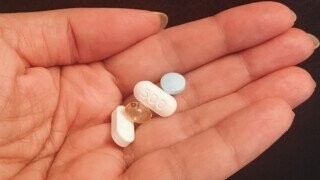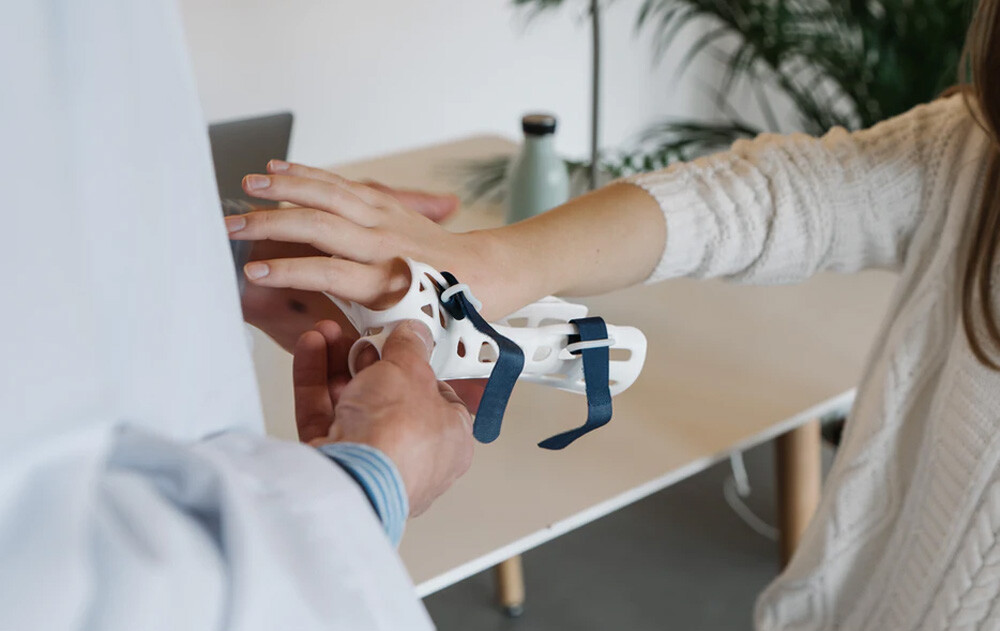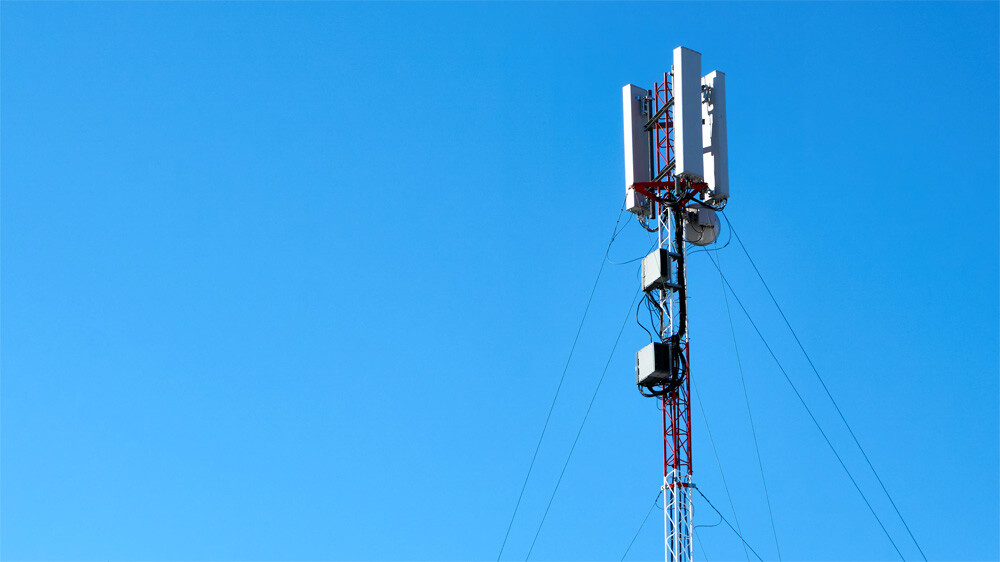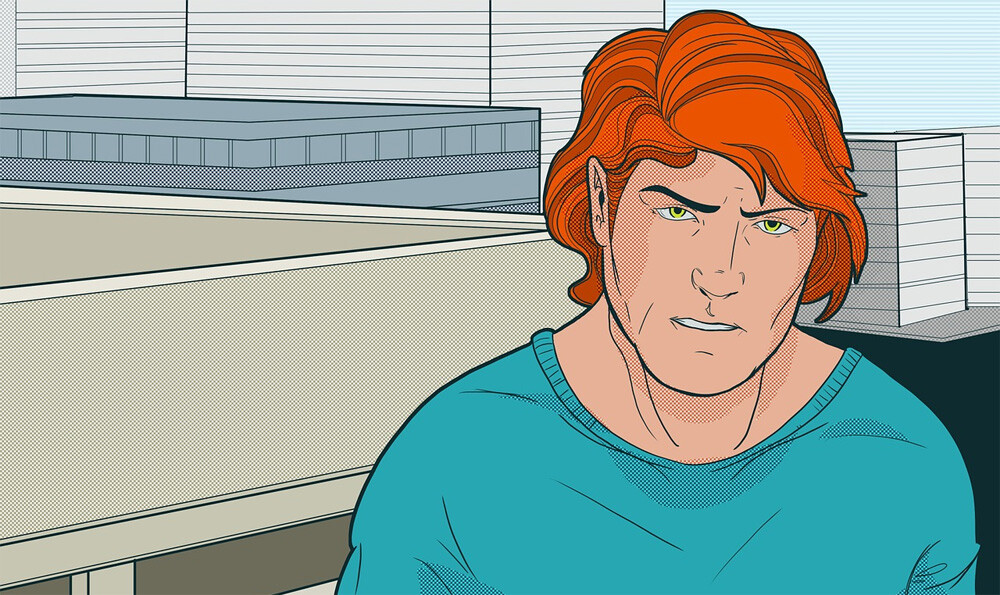6 Wild Stories Of People's Minds Messing With Their Bodies

For evidence that the universe is a simulation, look no further than the placebo effect and related mind-over-matter phenomena. Being able to make physical changes in the real world just by imagining it? Come one, what kind of made-up-sounding shit is that? But then again, the mind itself is the manifestation of electricity and chemicals spinning around inside some meat. So maybe it does make sense. We don't know.
Americans Are More Susceptible To Pain Placebos
They say everything's bigger in America. Guns, beers, trucks, and the placebo effect as well, according to a study of 84 clinical trials, spanning 23 years, from around the globe. Evidence of increased placebo response to antidepressant and antipsychotic medications inspired scientists to analyze whether the same held true for pain drugs. Jeffrey Mogil, head of McGill University's pain-genetics lab, found that it does, but only in the United States.

No, real drugs haven't gotten worse, as is apparent by the prevalence of opioid-addled soccer moms stumbling from minivans. But the efficacy of sham treatments rose precipitously in America over the past two decades: In 1996, a given drug produced 27% more pain relief than its fake counterpart. But by 2013, that figure fell to just 9%. And with less than a 10 percent difference, you're better off browsing the bulk candy aisle next time you run out of Tylenol.
Ironically, this runaway placebo effect may be due to the increased sophistication of modern studies. Global trials haven't increased as much in scope or size. But America's "Go Big" attitude has produced larger, longer, more expensive, and elaborate clinical studies, which may increase participants' expectations of a drug's effectiveness. And some trials may offer friendlier, more attentive nurse care, which you might find lacking in smaller studies where you're lucky to coax a smile from your nurse. Additionally, the constant bombardment of drug adverts on TV (illegal in most other places) may sway a populace that's unable to resist a good commercial.

This American placebo conundrum inspires numerous questions. Are drugs that fail clinical trials truly ineffective? Should clinicians test these drugs against competing medications rather than against sugar pills? Or, according to Harvard's placebo research director Ted Kaptchuk, should caregivers harness the mind-over-matter phenomenon to develop more non-pharmacological treatments?
Sure, a less drug-fuddled future sounds great. But remember who really suffers here: the innocent, well-meaning multi-billion dollar drug conglomerates. And is our collective health really worth it if it comes at the expense of big pharma's profits?
An Inactive Cell Phone Tower Sickens A South African Community
Some people would rather be miserable than happy and wrong. The residents of Craigavon, who became helplessly and angrily trapped in a mental quagmire of their own creation, are among those people. The fiasco began in August of 2009 when South African wireless provider iBurst erected a cell tower at Fourways Memorial Park in Sandton. Soon, the inhabitants of the nearby Craigavon residential estates began suffering mysterious ailments, including rashes, tinnitus, headaches, and sleep disturbances.

Armed with more initiative than skepticism, they formed the death squad-sounding Craigavon Task Force. They distributed flyers warning about the child-irradiating microwaves emanating from the tower, brandished their rashes, and made a big stink. So, despite their lack of medical or scientific proof, iBurst CEO Jannie van Zyl agreed to meet with the residents whose money he still needed to (presumably) complete his new infinity pool with a swim-up bar.
Van Zyl told the rash-ridden mob that the tower was no different than the other phone masts in the area. In fact, the radiation emitted was 10,000 times lower than international safety standards. Still, he agreed to temporarily switch it off. Shortly thereafter, with some residents still complaining, van Zyl dropped a Shyamalan-ian plot twist on their asses: the tower had already been deactivated six weeks earlier.

And since residents claimed that their issues dissipated within a day or two of leaving the area, this surely proved the tower's innocence. Thusly faced with such irrefutable evidence, the humble, understanding residents had a good chuckle and a pint and dropped the issue.
Haha, just kidding, the mob mentality doesn't work that way. The undaunted complainers continued their baseless health crusade. And even fabricated new complaints about environmental impacts and bureaucratic misconduct in the tower's planning and building. Finally, the mob won, and in December of 2010, the tower was taken down for undisclosed reasons, putting van Zyl's new pool in serious jeopardy.
Cursed Rocks And Petrified Trees Destroy People's Lives
Most tourists return from Hawaii with photographs, a sunburn, and, hopefully, got lei'd. But a few star-crossed sad sacks return with a curse that ruins their lives quicker than season 10 ruined The Simpsons. It's known as Pele's Curse, and no, not after the Brazilian footballing virtuoso. It's the divine wrath of Madame Pele, mother of the Hawaiian islands and goddess of volcanoes, fire, and lava. And it's bestowed upon foolish mortals who dare remove a single, sacred volcanic atom from the islands.

The stories of the damned are woefully similar. Timothy Murray led a blessed life until he took home some black sand. After returning to Florida (there's the first piece of bad luck), his five-year relationship ended, his pet died, and the FBI arrested him for (supposed) computer copyright infringement. Likewise, Pele cursed Larry Bell with surprise heart surgery, financial troubles, marital dissatisfaction, and serious health issues for his daughter. These narratives are surprisingly common, and thousands of pounds of material are sent back to Hawaii every year in hopes of atonement, along with reams of remorseful letters that have formed a collection longer than most translations of the Bible, including Klingon.
Of course, most of these mishaps resulted from random occurrences or, for example, allegedly committing computer copyright infringement. But the human brain requires logic, no matter how illogical, and people blame rocks, sand, twigs, and seashells. This is why Pele's Curse is not a singular phenomenon. Many other tourists are similarly blighted after pocketing bits of quartz from Arizona's Petrified Forest National Park.

After one woman's husband snaffled a petrified chunk, she experienced misfortunes befitting ancient Greek maidens who refused sex with Zeus. Her pets died, her appliances and vehicle failed, and her stepmother suffered kidney failure—though many would consider the latter a stroke of good luck. After a forced evacuation due to a gas well explosion, she sent back the 200-million-year-old Triassic trophy with a letter that reads like a guilt-wracked murder confession.
Many others have suffered illness, heartbreak, financial perdition, or all of the above. Over the past century, more than 1,200 penitents returned their goods along with similar "conscience letters." But unlike Hawaii's remitted rocks, which are wrapped up in auspicious "Ti-Plant" leaves and returned to Pele, the petrified chunks can't be replaced without ruining the park's "context." Instead, they're tossed into a gigantic "conscience pile," a purgatory where condemned pieces of quartz face eternal damnation.
Fake DNA Tests Produce Real Physiological Effects
Researchers constantly discover new ways that the placebo effect exerts its science-defying magic. Now, they've found that learning about one's genetic tendencies can actually change the physiological processes occurring inside the body.
Researchers at Stanford rounded up more than 200 people, possibly by dangling a $20 bill from a fishing rod, for a DNA test. They split them into two groups and tested for gene variants that influenced either hunger or exercise capacity. Then they played the ol' good cop bad cop routine. The hunger group received a meal, while the exercise capacity crowd ran on a treadmill. The participants' genetic predispositions affected meal satisfaction and fitness capacity as expected.

"You get a treadmill, and you will like it."
A week later, researchers recalled the participants (possibly with the promise of a Yankee Candle gift card) and disclosed their DNA test results—only, some were randomly falsified. The newfound knowledge, even when it was fake, significantly affected the participants' physiologies. Those told they were less prone to hunger produced 2.5-times more fullness hormone after eating the same meal they had the previous week.
Those told that they were genetically destined for cardiovascular inferiority performed worse on the treadmill test. They not only quit sooner, but their lung capacity and carbon dioxide-removing capabilities actually decreased. And here's the scientific money-shot: the participants' perceptions influenced their bodies more than the actual genes did.

For humanitarian reasons, scientists revealed the truth about an hour later, ensuring participants don't plunge into a Baskin-Robbins-and-Netflix-mediated downward spiral. So take solace in the fact that you aren't actually fat or weakly. You just think you are.
Expectations Exacerbate Medical Side Effects
The nocebo effect is like an inverse placebo effect; imagine if Ivan Pavlov killed his dogs by giving them kibble but telling them it was fair-trade Ghanaian chocolate. And this phenomenon can induce both immediate and long-term health problems.
Consider the case of "Mr. A," who remains unnamed to prevent ribbing from his friends. He downed a bottle of pills to commit suicide but immediately changed his mind. Luckily, he arrived at the ER just before a hyperventilating fit and low blood pressure caused him to collapse. His vital signs looked bleak, and doctors stabilized him with an IV drip. But medical tests found nothing amiss. And doctors soon discovered that he'd been in the placebo group of a clinical trial—Mr. A had overdosed on sugar pills. He made a complete, if egg-faced, recovery.

The nocebo effect can also indirectly kill you. Multiple studies show that it exacerbates medical side effects, causing some people to discontinue potentially life-saving medications, like the cholesterol-busting statins that reduce the risk of heart attack and stroke. One study involving 28,000 patients at two hospitals in Massachusetts found that only 55% remained on statins after six months.
Myalgia, or muscle pain, is one common complaint. But up to 90% could be due to the nocebo effect, according to Dr. Robert Greenfield, a triple board-certified cardiologist (basically a bandana-waving, Olde English-on-the-pavement-pouring triple OG). The result can be catastrophic: Greenfield cites another study in which statin-stoppers suffered a 40% increase in heart attacks and strokes one year after discontinuing the medication. Another study, tracking 60 people over a year, found that those who received dummy pills suffered side effects that were 90% as severe as those experienced by those who received actual meds.

Taking advantage of this nocebo quirk could actually improve patient outcomes, though it presents a Hippocratic conundrum. Doctors don't want to cause harm but also don't want to mislead patients by omitting information. So, according to an unrelated study, it's all about phrasing. Patients told there's a 70% chance that a side effect won't occur are less likely to experience it than those told there's a 30 percent chance that it will. The odds of being bankrupted by the medical services provided are closer to 50-50.
The Nocebo Effect Screws Students
The nocebo effect isn't just toxic. It's also highly contagious. Adolescents and students are especially susceptible, as they're already stressed by acne outbreaks, vicious hallway-bound rumors, and the dawning realization that life is little more than a series of character-crushing defeats.
Case in point: when a teacher reported a "gasoline-like smell" at a Tennessee high school in 1998, numerous students from 36 different classrooms reported headaches, nausea, dizziness, and drowsiness. Almost 100 students and staff were taken to the ER, and nearly 40 were kept overnight.

The school reopened less than a week later, and 71 more people were brought to the emergency room. The cause? Maybe an inattentive lunch lady? Fumes from a secret meth lab? Nope, bad mojo. An analysis found absolutely no sign of any toxins or harmful substances. Instead, scientists blame mass psychogenic illness caused by the nocebo effect's virulent contagiosity.
And in the fall of 2012, two dozen students from North Shore Technical High School in Middleton, Massachusetts, were mysteriously struck with hiccupping fits. Parents described them as loud and piercing or as hiccups that evolved into "a high-pitched yelp." Scientists classified these enigmatic oral ejaculations as vocal tics but couldn't pinpoint a cause.

"Have you ever seen teens stick to anything for five months?"
The symptoms began to just as mysteriously abate in early 2013 when a similar outbreak occurred at North Shore Tech's nearby sister school, the Essex Agricultural and Technical High School in Danvers. Investigators checked for noxious substances but found no trace of any harmful agents at the school or in the environment. Medical sociologist Robert Bartholomew blames the subject of his expertise, mass hysteria, and claims the associated stigma makes authorities unlikely to categorize it as such.
Our explanation? A Hocus Pocus-style retribution from beyond the grave, ordained by the vengeful souls of murdered innocents. Because this incident happened to take place at the site of the accursed and damned Salem Village.
Top Image: Pina Messina/Unsplash